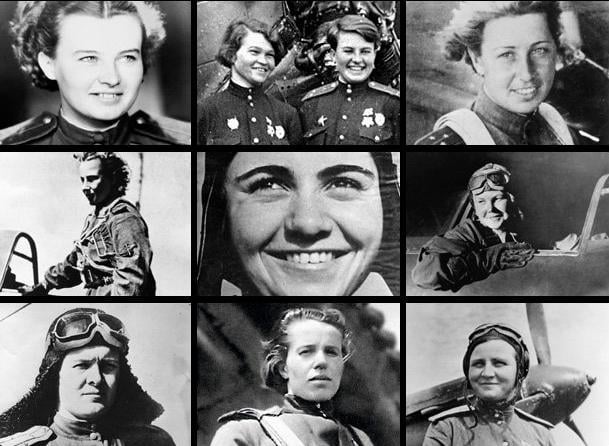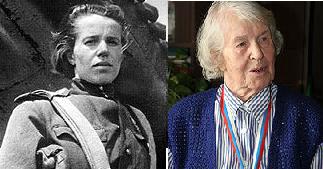
Terrified German officers called them Night-Witches. ‘Night’ because of the way they idled their engines to glide silently over German cities in daring night-time bombing raids. And ‘witches’, because they were women.
Today, the BBC aired an unmissable documentary about the legendary Soviet 46th Night Bombers Guards Regiment, the first female combat fighter pilots in the world.
It is a poignant story of thousands of women, many of them teenage girls, overcoming traditional gender roles to demonstrate extraordinary heroism in defence of their motherland.
But in focusing on two ace pilots in particular, it is equally a warning against the politicisation of WWII, which has lately been appropriated to show off nuclear missiles on Red Square, stir national chauvinism and even rehabilitate Stalin. So much so, in fact, that President Medvedev was recently moved to deliver an unprecedented attack on the revival of Stalin’s legacy.
The author-narrator, Lucy Ash, speaks with some of these last remaining heros, including Galina Beltsova, a highly decorated fighter pilot feted by the Kremlin. Beltsova recalls the fear of being captured by the Germans; tears spring to her eyes when describing the break-up of the USSR.
But then there is her comrade Anna Yegorova. Hit by anti-aircraft fire, badly burnt and with a damaged parachute, she fell to the ground, suffering serious injuries. “The most dreadful thing’, she recalls, ‘was opening my eyes and seeing Germans in front of me’.
She then spent 5 months in a Nazi concentration camp. Yet shockingly, what was more harrowing still was her treatment afterwards by her own people.

As soon as she was liberated from the camps, barely alive, she was dragged off to be interrogated by SMERSH counterintelligence. “They swore at me, said I was the scum of the earth, that i switched sides and joined the Germans; they treated me like an animal and called me a fascist bitch’, she recalls. When, after more than 20 years, she was formally rehabilitated and named a Hero of the Soviet Union, she remembers, “I felt burnt out, I felt no joy or satisfaction. It felt numb. After the SMERSH tortured me, something within me died. God save anyone from such treatment”.
“Even after all these years’, concludes Ash, ‘Anna still struggles to reconcile the conflicting emotions inside her. The same could be said in larger relief about her country, and its tortured recollection of the war years”.
The same, indeed, could be said for the whole history of the USSR – a series of contradictions and paradoxes, leaps and retrenchments, spectacular heroism, as well as savagery, betrayal, love and achievement, done, often by the same people, to each other – which can no less be separated into discrete fragments than the elements of a human life.
To wit, “the Soviet Union was the first nation to allow women to fly combat missions. Women pilots in other countries flew military aircraft in support roles and some were fired on by enemies. But only Soviet women pilots could fire back; only Soviet women dropped bombs and fought in air battles”. And yet the same Soviet Union then tried to shut down these female squadrons once the war was over.
The Soviet Union which both Anna and Galina defended in the face of almost certain death, but which repaid one with gratitude and the other with torture; the Soviet Union of both SMERSH interrogators and of Night-Witches.
Conservative Russians and those of an anti-Western disposition argue, correctly, that all too often the West cares to know and focus only on the Soviet Union’s crimes, and not on its achievements – human, technological and military, including its central role in WWII victory.
But accepting the essential truth of this grievance bestows no corresponding right of amnesia; to do so would be to repeat the very ignorance and bias that they rightly denounce. For only those who lack faith in Russia, who doubt that there are enough Nightwitches and Sakharovs and Akhmadulinas to counter-balance the Stalins and Berias, can be afraid to confront the Soviet past head-on.